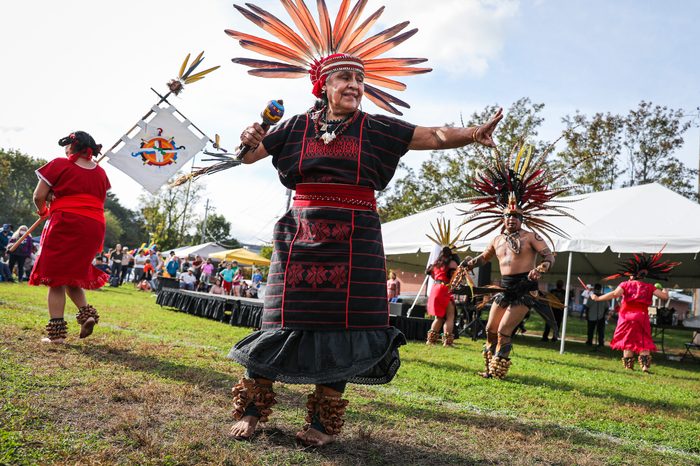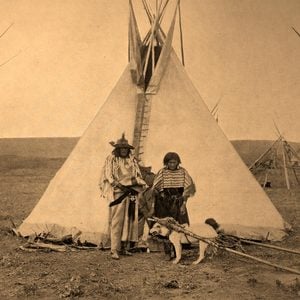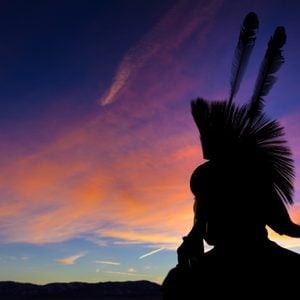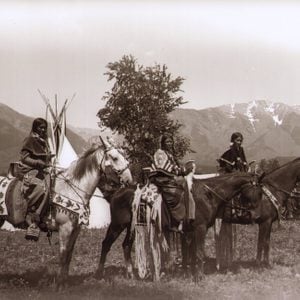Indigenous Peoples’ Day and Columbus Day: 5 Things You Need to Know
Updated: Oct. 04, 2022

President Biden officially proclaimed October 10 Indigenous Peoples' Day, but Columbus Day is not behind us yet. Here's why.
Everyone has heard of the famous (or depending on the point of view, infamous) explorer Christopher Columbus. Hailing from Genoa, Italy, but crossing the ocean in the name of the Spanish Crown, the explorer made his mark on history when he accidentally stumbled upon the Americas in 1492. The school rhyme, “In 1492, Columbus sailed the ocean blue,” has since become one of the cornerstones of American education. The problem: Many of the oft-remembered historical moments didn’t happen quite the way our textbooks said they did. This conflict between reality and fiction is what makes Columbus Day one of the most controversial holidays in America. It’s also why it’s crucial we learn facts about Native Americans and recognize Native American traditions, Native American heroes, and Indigenous Peoples’ Day.
On October 8, 2021, President Biden moved the nation closer to the truth by becoming the first to officially recognize October 10 as Indigenous Peoples’ Day, a holiday that has been proposed by Native tribes for decades. “For generations, Federal policies systematically sought to assimilate and displace Native people and eradicate Native cultures. Today, we recognize Indigenous peoples’ resilience and strength as well as the immeasurable positive impact that they have made on every aspect of American society,” he writes in a statement released by the White House.
Biden continues his proclamation with a vague commitment to human rights and a “brighter future and promise of equity for Tribal Nations.” So what are the implications of the president’s words on Indigenous Peoples’ Day, both in terms of history and the future of the country? First, let’s establish some facts.
Indigenous Peoples’ Day is still not a federal holiday
While Biden’s statement represents an extraordinary step forward for the federal government, a press statement does not make Indigenous Peoples’ Day a federal holiday. Congress holds the power to establish federal holidays, as it did with Columbus Day in 1971, and that leap still has not been taken.
But the words of a sitting president do carry weight, and they very well may set the stage for Congress to take up such legislation in the not-too-distant future. After all, Juneteenth, a day marking the military enforcement of President Lincoln’s Emancipation Proclamation freeing enslaved African Americans, was just declared a federal holiday in January 2021.
Native Americans have been fighting for the holiday since 1977
While the highest office in the land is only now speaking to Indigenous Peoples’ Day, the concept of a holiday about Native American history replacing Columbus Day is not new. The idea was first proposed back in 1977 at a United Nations conference that had been convened to address discrimination against Native peoples.
After that, it slowly began to take hold in states across America. So while the federal government still does not consider it a legal holiday, more than 15 states do—and some have turned away from Columbus Day entirely.
Advocates say making Indigenous Peoples’ Day a national holiday would help counter the whitewashing that’s all too common in American history. Just compare the Thanksgiving story most children hear in school against the real history of Thanksgiving.
South Dakota was the first state to make the change
The first state to abandon Columbus Day was South Dakota, which officially renamed the holiday Native American Day in 1990. Interestingly, the state is home to one of the most controversial monuments, Mount Rushmore, which rests on stolen Sioux land.
Other states followed suit over the years, including Alaska, Iowa, Louisiana, Maine, Michigan, Minnesota, New Mexico, Oregon, Vermont, Wisconsin, and the District of Columbia. In addition, the state of Hawaii celebrates Discoverer’s Day to recognize the Polynesian discoverers of the Hawaiian islands. Even in states that do not recognize Indigenous Peoples’ Day, there are many municipalities whose local governments have done so.
Columbus and his men committed atrocities
At the heart of the matter lies the simple, horrible fact that Christopher Columbus and his men committed many atrocities against the Native peoples of the Americas, including rape, enslavement, and the spreading of disease. (Not to mention this little fact about Christopher Columbus: He wasn’t even the first explorer to arrive at these lands; the Vikings, led by Leif Eriksson, beat him to it by about half a millennium.)
Case in point: The native Taino who greeted Columbus when he stumbled upon the Caribbean islands in 1492 had been living there for thousands of years. By the mid-1500s, they were practically extinct.
So why are some people still so insistent about celebrating this guy? The main push to keep Columbus Day a national holiday comes from the Italian American community.
There is still conflict between Italian Americans and Native tribes
Being an immigrant in the United States has never been easy. In the late 1880s and early 1900s, when the first wave of Italians resettled in America, they faced intense disdain and discrimination. For this displaced community, the celebration of Christopher Columbus was a beacon of hope that one day the greatness of all Italian Americans would be embraced.
That is why today, despite the controversy surrounding the true history of Columbus, Italian Americans cling to him as a figure of Italian heritage and accomplishment. The National Italian American Foundation still proudly refuses to relinquish Columbus Day, choosing to remember the explorer as “the catalyst that initiated over 500 years of immigration to the Americas by people from every corner of the Earth.”
Times, however, are changing. America is reckoning with its past and rethinking the people and symbols it celebrates in the present. (Which is why you’re now hearing talk of the racist history of Mount Rushmore.) It’s possible that one day the National Italian American Foundation will settle on an alternate historical figure to represent Italian Americans’ rich cultural heritage. The needle has already moved, with many positive changes happening since the anti-racism movement began.
Sources:
- The White House: “A Proclamation on Indigenous Peoples’ Day, 2021”
- NPR: “Goodbye, Columbus? Here’s what Indigenous Peoples’ Day means to Native Americans”
- The Wall Street Journal: “Indigenous Peoples’ Day and Columbus Day: What to Know”
- Smithsonian Magazine: “Rethinking How We Celebrate American History—Indigenous Peoples’ Day”
- University of Hawai’i at Mānoa: “A Little Research About Discoverers’ Day in Hawaiʻi”
- Library of Congress: “The Great Arrival”
- Library of Congress: “Exploring the Early Americas”
- National Italian American Foundation: “Christopher Columbus”



